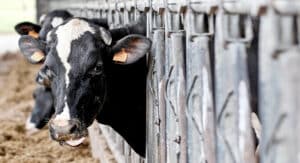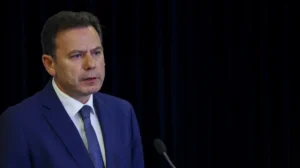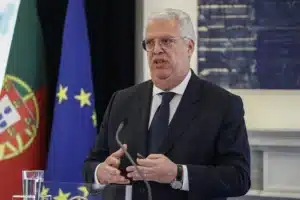Brussels applauds President Trump’s 90-day reprieve
Government ministers are meeting today to discuss the whole issue of tariffs in light of conversations it has had with the business sector.
The Council of Ministers coincides with the news that President Trump has issued a 90-day reprieve for the so-called ‘reciprocal’ tariffs announced last week, after bond and stock markets went haywire.
Financial markets are ‘rebounding today’ but the overall feeling is still one of uncertainty, as no one appears able to forecast what will come out of the White House next.
In that context, Portugal’s businesses need to feel that the government has their back – which is what the message this far appears to want to convey.
According to one of the business leaders involved in meetings with the ministers of economy and finance this week, the government is preparing a “robust plan”, with measures to support the industry sectors.
Mário Jorge Machado, president of ATP (the Portuguese association of textiles and clothing) said that business leaders were assured that a “comprehensive set of measures” would soon be presented, ranging from training, internationalisation and export. The bottom line being that this lull in the chaos will definitely be used to develop the diversification of markets.
Portuguese exports to the US account for over €6 billion, while imports from the US come in way lower (€2.6 billion).
Portugal’s response, however, will be linked to that of Brussels, which has welcomed the slowdown of President Trump’s zeal.
Writing over social network ‘X’, president of the European Commission, Ursula von der Leyen, said Mr Trump’s announcement to suspend reciprocal tariffs “is an important step towards stabilising the world economy. Clear and predictable conditions are essential for the functioning of trade and supply chains”.
Initially, it was unclear whether EU countries were part of the group of countries side-stepping the worst of the tariffs for the foreseeable future. Mr Trump actually said he was putting a pause on countries that had not ‘retaliated’ (which of course Europe has, in its own way – putting a 25% tariff on a number of US imports, which it too has now agreed to pause for 90-days). The pause will allow European leaders to continue with negotiations towards a deal with America.
For now, the ‘zero-for-zero’ proposal extended at the start of the week has been rejected. Ms von der Leyen continues to stress that “tariffs are taxes that only harm businesses and consumers” which is why Brussels “remains committed to constructive negotiations” with Washington.
Europe in the meantime is still having to bear the 25% tariffs brought in by Mr Trump on imports to the US of European steel and aluminium, as well as the 10% baseline tariffs.
As reports stress, “the White House’s decision to apply tariffs to the EU bloc has also accelerated the European Commission’s agenda of looking for other partners, with the commission working on the 87% of world trade without the United States, and on partners such as Mercosur and India”.
China meantime remains locked in a tariff war with the Trump administration – and the effects of this will, ultimately, substantially affect global trade.




















